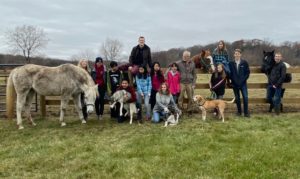Today we have a type of guest post by Elizabeth Curry, a mom to 12, horse owner, and volunteer at HorsePower TR. She wrote an article for HorsePower TR about working with Oppositional Defiant Disorder (ODD), and has kindly agreed to share it with us! She originally posted the article on her own blog Ordinary Time, so to support her work, I will share the first few paragraphs here and then link to the rest of the article there, where you can finish it and perhaps travel down the rabbit hole of Ordinary Time.
I truly hope this gives you as a instructor insight into and help with your participants. Enjoy!
Working With Oppositional Defiant Disorder (ODD)
On the surface, ODD is a diagnosis which characterizes the behavior of a child who does not cooperate, who shouts, “No!”, who is rude, and in general is unpleasant and difficult. Even though I have a child (or two depending on the day’s functioning) who exhibit these characteristics, I do not find the ODD diagnosis to be overly helpful. This is mainly because it is a diagnosis which merely describes a set of symptoms or behaviors instead of addressing the cause of the behavior. It would be like diagnosing a child with hearing loss when in reality that child has wax build-up in their ears. Addressing symptoms instead of causes doesn’t do anything with regards to real healing.
The reality for most children with an ODD diagnosis is that it is based in past trauma. Trauma can be big things that we typically think of… loss of parents, change of home, abuse, and/or neglect… but trauma, because of the way cortisol floods the brain under stress and rewires it, can also be caused by a traumatic or particularly stressful pregnancy, traumatic birth, prematurity, prolonged hospital stays, or pain experienced in infancy. Trauma can be a one-time event that is not processed in a supportive atmosphere, or it can be the result of long-term suffering. All trauma changes the brain and makes it more difficult for positive, higher thinking processes which occur in the frontal cortex to happen. Instead, thinking and behavior remain stuck in the pre-verbal, autonomic reactions in the lower parts of the brain.
It is easy to see a presenting behavior and think one thing is happening, when it is another thing altogether. This is the oppositional defiance part. It feels willful to the adult interacting with the child. It feels personal. In general, it doesn’t feel good. For anyone. But really what is happening is something completely different.
Click the image below to read the rest of the article!
ABOUT THE AUTHOR

Elizabeth Curry is mother to twelve children, five of whom were adopted: two from Vietnam and three from China. She hopes that by sharing the experiences of her family she can encourage others in the trenches. Elizabeth lives in Illinois where she volunteers with Horse Power Therapeutic Riding. You can find more of her writing at Adoption.com and on her blog Ordinary Time.
****************
Note: This is not professional advice, this is a blog. I am not liable for what you do with or how you use this information. The activities explained in this blog may not be fit for every rider, riding instructor, or riding center depending on their current condition and resources. Use your best personal judgement! If you would like to contribute an activity or article, please contact me here, I would love to hear from you!

Thank you so much for sharing this! I work as an educational assistant for the school board when I’m not at the farm teaching and this describes 3 of the kids at school who currently have the team tearing their hair out on a daily basis. I’ll definitely share it!
Excellent – thank you !